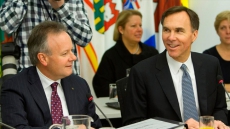VICTORIA — The federal government's election promises are expected to be closely examined by the country's health ministers during an annual meeting that's expected to be more co-operative than in past years.
British Columbia's Health Minister Terry Lake, who is co-hosting the talks in Vancouver this week, said his counterparts are eager to invite federal Health Minister Jane Philpott to discuss issues such as chronic diseases, drug costs and funding formulas.
"This is an opportunity to re-engage with the federal government in a broader way on health care because the previous federal government was less hands on, if you like, when it came to health care," Lake said.
"We get the impression from the federal government that they want to be more involved. So this is an opportunity."
The provincial and territorial ministers will meet Wednesday, with the federal government joining the discussions on Thursday.
During last fall's election campaign, the Liberals promised to negotiate a new health accord with provinces and territories, including a long-term deal on funding.
The party said it would modernize health care, including investing $3 billion over the next four years to improve home-care access across Canada. It also pledged to improve access to mental health services and medication while cutting the cost of prescription drugs.
Philpott said she expects discussions to focus primarily on policy issues and transforming a health accord, which provides the provinces and territories with stable funding and sets national standards.
"Making sure we agree on where the changes need to be made," she said, noting the government is looking to get better value for the money it already spends.
"I think that most of my colleagues will agree with me that injecting more money into the system isn't always the way to go, and isn't always the best way to be able to drive change."
She said "collaboration and co-operation" will be the means to achieving shared goals during the talks.
Saskatchewan Health Minister Dustin Duncan said his top concern is ensuring the system's overall sustainability.
"We can't just be pouring more money into the system and hoping for a better result."
Lake noted another issue will be trying to convince the federal government and Quebec to join a nationwide prescription drug-buying alliance, lowering the cost of prescription drugs through bulk purchasing.
The ministers also want to discuss a new doctor-assisted dying law, which Ottawa must craft after getting a four-month extension on Friday from the Supreme Court of Canada.
"We need to hear from the feds how they plan to move forward," Lake said.
He added that B.C. and the Atlantic provinces are not satisfied with the federal government's funding formula because it doesn't recognize the higher costs borne by provinces with aging populations.
Philpott, however, said she hopes provinces and territories "will not be too distracted" by the specifics of Canada's health payments to various jurisdictions, noting that's a larger conversation.
Health ministers from the four Atlantic provinces met prior to the Vancouver gathering and decided to focus their attentions on improving care for people with chronic diseases, which primarily affect the elderly.
"We will go with a very strong common front to this conference," said Nova Scotia Health Minister Leo Glavine.
Public health expert Michael Prince said he expects the meetings to set a tone of collaboration after the blunt relations with the former Conservative government, but doesn't expect major announcements.
"I hope there is a new spirit. I think there is," he said from the University of Victoria. "Health care, unlike some other policy fields, is a very entrenched, very institutionalized, very established set of vested, powerful interests."






